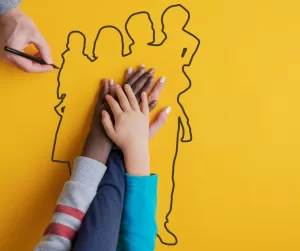
When parents direct their kids and tell them what they should do to improve themselves, it lands on the child as I’m not okay the way I am, instead of empathy in action.
Q. “How can I help my 8 year old son understand that I love him just the way he is AND I want him to grow, learn and improve? He says he feels humiliated and ashamed every time I ask him to learn something new because he feels like I’m saying he needs to be better than he already is.”
A. How wonderful that your son can tell you how your requests feel to him. So many kids just cram their feelings inside, and so many parents dismiss and deny their remarks with comments like, “That’s not true. I love you just the way you are. I just want you to learn to do new things.”
That sounds logical—to the mind of an adult. But an eight year old doesn’t read it that way.
The hard part for the parent is to listen and learn from the Read more…








 Your goal for your children is to raise strong, self-confident, resilient, independent humans who contribute to society, right? This doesn’t just happen somewhere in the teen years. It starts from setting family values that begin with
Your goal for your children is to raise strong, self-confident, resilient, independent humans who contribute to society, right? This doesn’t just happen somewhere in the teen years. It starts from setting family values that begin with  A. The Foundation: You, the parent.
A. The Foundation: You, the parent.  Story: My strong willed 8 year old was diagnosed with anxiety and displays this with anger. Last March I got diagnosed with cancer and needed surgery. His anxiety hit the moon. He’s been acting out by throwing a ball at kids, stepping on their feet, throwing sand, yelling, etc. I practiced your principles of empathy, and he was able to tell me about a kid teasing him for not climbing the rock wall. I would never have found this out had I not set aside his behavior and my problem, used compassion and empathy, and listened. Yesterday when I picked him up, he came running into my arms and cried and cried really, really hard. WOW! He hasn’t cried like that in years. He cried the whole way home and continued at home and let me just sit there with him. I used empathy when needed and let him say all these horrible things about a kid who’s been bullying him. Bingo, I got to the root of his behavior, went right past those weeds. I did my best to
Story: My strong willed 8 year old was diagnosed with anxiety and displays this with anger. Last March I got diagnosed with cancer and needed surgery. His anxiety hit the moon. He’s been acting out by throwing a ball at kids, stepping on their feet, throwing sand, yelling, etc. I practiced your principles of empathy, and he was able to tell me about a kid teasing him for not climbing the rock wall. I would never have found this out had I not set aside his behavior and my problem, used compassion and empathy, and listened. Yesterday when I picked him up, he came running into my arms and cried and cried really, really hard. WOW! He hasn’t cried like that in years. He cried the whole way home and continued at home and let me just sit there with him. I used empathy when needed and let him say all these horrible things about a kid who’s been bullying him. Bingo, I got to the root of his behavior, went right past those weeds. I did my best to 
 Q. My 8 year old son is constantly talking back to me and using vulgar language. I tell him that is not acceptable, and he keeps doing it. He argues and doesn’t listen to authority—my authority anyway. He’s fine at school. Teachers love him. When I was young, I would have been smacked if I said half of what he does. I’m at a loss. What do I do to stop this constant talking back and throwing crude words at me?
Q. My 8 year old son is constantly talking back to me and using vulgar language. I tell him that is not acceptable, and he keeps doing it. He argues and doesn’t listen to authority—my authority anyway. He’s fine at school. Teachers love him. When I was young, I would have been smacked if I said half of what he does. I’m at a loss. What do I do to stop this constant talking back and throwing crude words at me?
 Instead of starting off the new year with resolutions you are likely to ignore, how about deciding to accept yourself and your kids just the way you are?
Instead of starting off the new year with resolutions you are likely to ignore, how about deciding to accept yourself and your kids just the way you are?  Are you trying to do the right thing by validating your child’s feelings only to hear even angrier tirades? Your best intentions backfire and you don’t know why. Let’s break this down to figure out why your child is reacting negatively when you are trying to empathize.
Are you trying to do the right thing by validating your child’s feelings only to hear even angrier tirades? Your best intentions backfire and you don’t know why. Let’s break this down to figure out why your child is reacting negatively when you are trying to empathize. Q. My 9 year old boy’s behavior is driving me nuts and making me feel like failure. He is a strong-willed, smart boy, who will do anything only if he likes it. There are many things he decides he doesn’t like to do or eat, and there is no cajoling that can get him to give it a try. But my bigger problem here is his constant lying. He cannot stop himself from lying and sneaking. And this
Q. My 9 year old boy’s behavior is driving me nuts and making me feel like failure. He is a strong-willed, smart boy, who will do anything only if he likes it. There are many things he decides he doesn’t like to do or eat, and there is no cajoling that can get him to give it a try. But my bigger problem here is his constant lying. He cannot stop himself from lying and sneaking. And this After the shooting at Sandy Hook Elementary, I wrote an article called Look for the Helpers inspired by Fred Rogers. I am redoing it with the same basic
After the shooting at Sandy Hook Elementary, I wrote an article called Look for the Helpers inspired by Fred Rogers. I am redoing it with the same basic